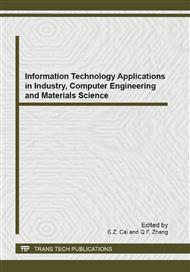p.3236
p.3241
p.3246
p.3250
p.3254
p.3260
p.3265
p.3271
p.3276
Parallel Artificial Bee Colony Algorithm for the Traveling Salesman Problem
Abstract:
Artificial Bee Colony Algorithm (ABCA) is a novel swarm intelligence algorithm which a colony of artificial bees cooperate in finding good solutions for numerical optimization problems and combinatorial optimization problems. Traveling Salesman Problem (TSP) is a famous combinatorial optimization problem which has been used in many fields such as network communication, transportation, manufacturing and logistics. However, it requires a considerably large amount of computational time and resources for solving TSP. To dealing with this problem, we present a Parallel Artificial Bee Colony Algorithm (PABCA) in several computers which operation system is Linux based on the Message Passing Interface (MPI). The entire artificial bee colony is divided into several subgroups by PABCA equally. Each subgroup performs an ABCA for TSP on each processor node, respectively. Each sub-colony on every processor node communicates the current best fitness function and parameters of current best fitness function according to ring topological structure during calculation process. Some well-known benchmark problems in TSP are used to evaluate the performance of ABCA and PABCA. Meanwhile, the performance of PABCA is compared with Genetic Algorithm (GA) and Particle Swarm Optimization (PSO). Experimental results show that the PABCA can obtain solutions with equal precision and reduce the time of computation obviously in comparison with serial ABCA. And PABCA have much better performance in contrast with GA and PSO.
Info:
Periodical:
Pages:
3254-3259
Citation:
Online since:
September 2013
Authors:
Price:
Сopyright:
© 2013 Trans Tech Publications Ltd. All Rights Reserved
Share:
Citation:


